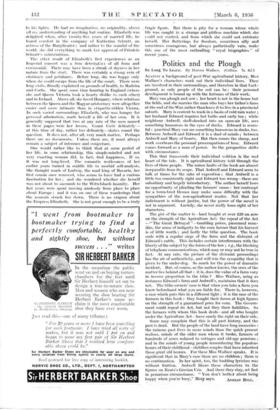Politics and the Plough
So Long To Learn. By Doroon Wallace. (Collins. 7e. &I.) AGAINST a background of post-War agricultural history, Miss Wallace's characters work out their individual lives. They are involved in their surroundings; and therefore in that back- ground, as only people of the soil can be : their personal development is bound up with the fortunes of their work.
Mary can plough and sow ; her heart is not in the house but the fields, and she marries the man who buys her father's farm at the end of the War,rather than leave it to live in a provincial suburb. Mary is content to wash in a basin of cold rain water ; her husband. Edward requires hot baths and early tea ; while neighbour Ardwell, shell-shocked into an open-air life, sees something humorous in the eyes of ducks. Edward is scorn- ful : practical Mary can see something humorous in ducks, too. Between Ardwell and Edward it is a duel of .minds ; between Ardwell and Mary of hearts. But then comes the slump, and work overbears the personal preoccupations of love. Edward conies forward as a man of power. So the perspective shifts with circumstance.
This that transcends their individual volition is the real heart of the tale. It is agricultural history told- through the lives of three people. The minor faults of the book are almost inseparable from its scope. That Ardwell and Edward seem to talk at times for the sake of exposition ; that Ardwell is a little too consistently right and Edward too wrong—these are subsidiary and largely introductory. The author herself loses no opportunity of pleading the farmers' cause : her.contempt for a town-bred Demos may make some difficulty with the sympathies of the non-agricultural reader. Not that her indictment is without justice, but the power of the novel is not in argument. Luckily, she never really loses sight of her characters.
The gist of the matter is—land bought at over 120 an acre on the strength of the Agriculture Act; the repeal of the Act —" The 'Great Betrayal "—tumbling prices, -piecemeal reme- dies, the sense of indignity to the corn farmer that his harvest is of little worth ; and lastly the tithe question. The book ends with a regular siege of the farm and the distraint of Edward's cattle. This includes certain interferences with the liberty of the subject by the forces of the law ; e.g., the blocking of telephone communications, which may or may not be true in fact. At any rate, the picture of the distraint proceedings has the air of authenticity, and will win the sympathy that is given to the under-dog. So much for the power of dramatic incident. But, of course, as the author knows, the crux of the matter lies behind all that : it is, does the value of a farm vary in inverse proportion to the tithe ? Miss Wallace, using as instances Edward's farm and Ardwell's, maintains that it does not. The tithe-owners' case is that when you take a farm you know beforehand what you are liable for. There is, however, a case which puts this in a different light ; it is the case of the farmers in this book : they bought their farms at high figures on the strength of a guaranteed price for corn. The Govern- nient could repeal its Act, but not they their liabilities. So the farmers with whom this book deals—and all who bought under the Agriculture Act—have surely the right on their side.
Some may complain that this is all past history, and the past is dead. But the people of the land have long memories : the ruinous past lives in more minds than the quick present realises, minds of the older men whom it broke, farmers of hundreds of acres reduced to cottages and old-age pensions ; and in the minds of young people' remembering the populous homes of their childhood—childless couples that have inherited those great old houses. For these Miss Wallace speaks. It is significant that in Mary's case there are no children ; there is no continuation. In her spirit, too, the budding lyricism was without fruition. Ardwell likens these characters to the figures on Keats's Grecian Urn. And there they stay, set fast in penurious circumstance. " You don't bother about being
happy when you're busy," Mary says. ADRIAN BELL.
















































 Previous page
Previous page